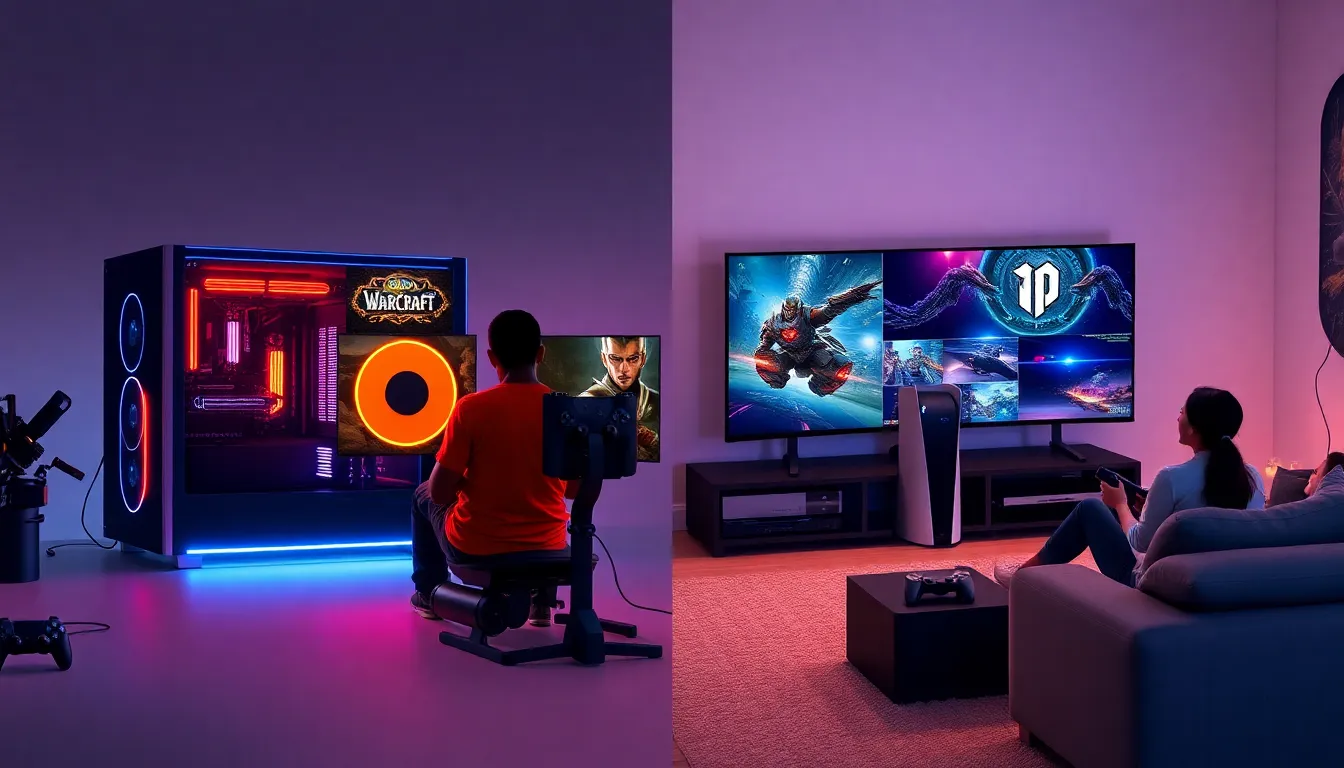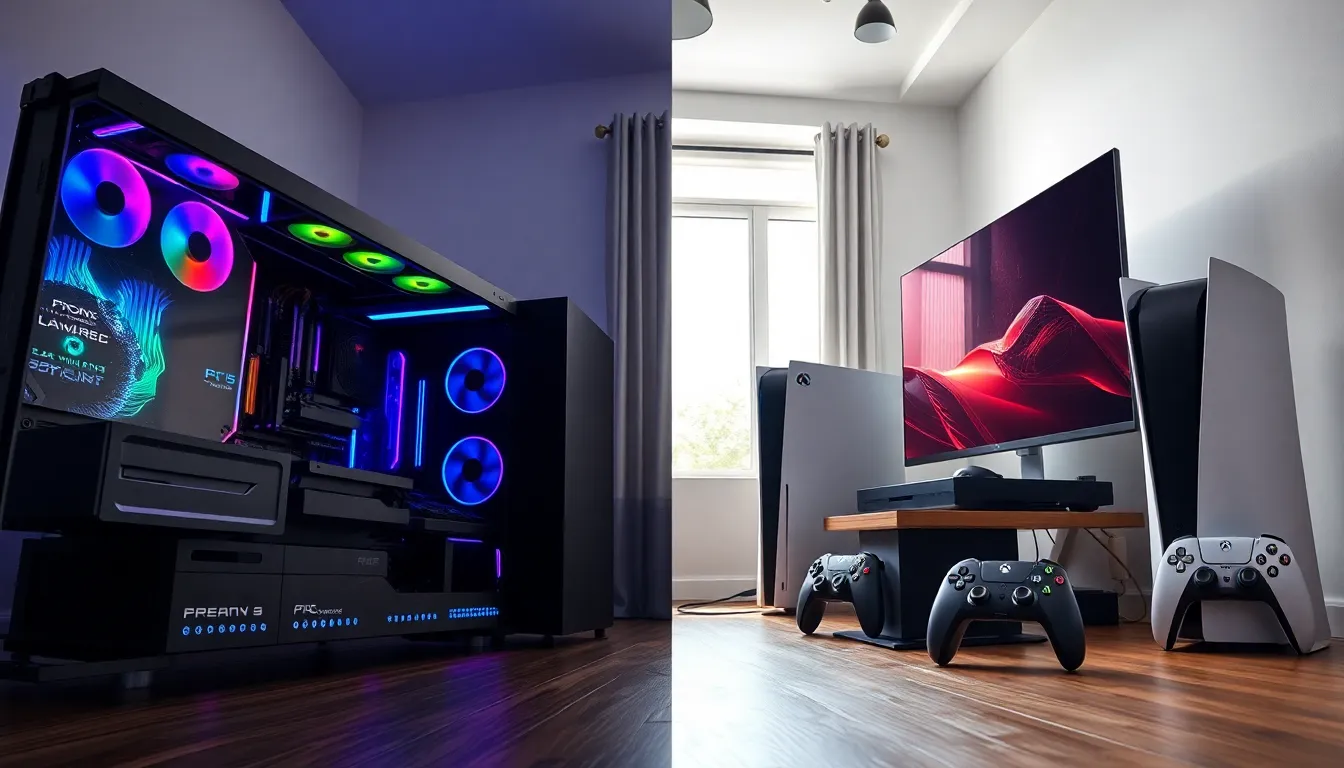When it comes to the battle of gaming platforms, we have two heavyweights: PC gaming and console gaming. They’re like Batman and Superman, both amazing but in very different ways. It’s not just about graphics or performance: it’s about lifestyle, preferences, and what gets your gaming heart racing. Whether you’re a button-masher or a hardcore strategist, let’s jump into this epic face-off and see which platform reigns supreme.
Table of Contents
ToggleOverview of Gaming Platforms

History of PC Gaming
PC gaming has roots that stretch back to the late 1970s and early 1980s. Remember playing games like Pong or Space Invaders? Those were the humble beginnings of a platform that has now flourished into a dynamic landscape with endless possibilities. Over the years, PCs evolved from simple home computing devices to powerhouses capable of rendering stunning graphics and running complex simulations. Titles like Doom and Warcraft laid the foundation for the modern gaming experience. Unlike consoles, PCs have undergone continuous upgrades, adapting to the demands of an ever-evolving gaming community.
History of Console Gaming
Now, let’s swap gears to consoles. The first commercially successful home console was the Magnavox Odyssey, released in 1972. But, it wasn’t until the release of the Atari 2600 in 1977 that console gaming truly took off. Fast forward to today: consoles have transitioned from simple, cartridge-based systems to sophisticated machines like the Sony PlayStation 5 and Xbox Series X. Each generation has sought to enhance the gaming experience, introducing features like online multiplayer and virtual reality, making it an essential staple in living rooms around the world.
Key Differences Between PC and Console Gaming
Hardware and Performance
The debate often boils down to hardware capabilities. PCs have the upper hand in performance metrics. With options for high-end graphics cards and extensive RAM, PC gamers enjoy superior processing power, leading to better graphics, smoother frame rates, and faster loading times. But consoles offer their own charm. They’re designed for streamlined performance right out of the box, often yielding high-quality graphics tailored to specific systems.
Game Library and Exclusives
When it comes to game libraries, things are nuanced. PCs boast a vast selection of titles across genres, often including indie sensations and mods unavailable on consoles. Meanwhile, consoles typically hold exclusive rights to blockbuster franchises. Think God of War or Halo, these games can influence a gamer’s choice of platform significantly.
Customization and Upgradability
Customization is where PCs shine. Gamers can mix and match components like processors, graphics cards, and storage to suit their preferences. Want to switch out that old graphics card for the latest and greatest? Go for it. Conversely, consoles are more restrictive: while you can tweak settings and download updates, altering hardware is generally not an option.
User Experience and Accessibility
Controls and Gameplay Mechanics
When it comes to controls, both platforms have their advantages. Consoles typically come with user-friendly controllers that are comfortable and straightforward, making them accessible for everyone. On the flip side, PC gamers often prefer the precision of a mouse and keyboard, particularly for genres like first-person shooters and real-time strategy games. This preference boils down to personal choice, with various players swearing by one setup over the other.
Online Services and Multiplayer Options
Multiplayer capabilities differ as well. Consoles have established networks like Xbox Live and PlayStation Network, which foster communities and offer game sharing amongst players. But, PC gamers can access platforms like Steam and Epic Games, which host massive libraries of games along with user reviews and community features that enhance the gaming experience.
Price and Cost of Ownership
Initial Investment and Long-Term Costs
Let’s talk dollars and cents. Consoles generally come with a lower initial investment. They’re ready to go for the price of entry, working efficiently out of the box. But that initial price can disguise the long-term costs associated. PCs can be more expensive to set up upfront, but once you own it, the upgrade path often pays off over time.
Value for Money and Sales Opportunities
Value for money is also a crucial factor. Sale events and discounts on PC platforms can significantly cut costs, allowing players to buy games they might otherwise skip. While consoles offer special edition bundles during the holidays, PC sales can rival any commercial discount, especially during Steam sales, where you can snag massive discounts.
Future of PC and Console Gaming
Emerging Technologies and Trends
Looking ahead, both platforms are poised for exciting developments. The rise of cloud gaming, where games are streamed directly to your device, poses a new frontier. This advancement could transform how gamers interact with their systems. Similarly, improvements in VR and AR promise to enhance the immersive experiences each platform can deliver, keeping the competition lively.
Cross-Platform Gaming and Community Growth
Another trend gaining traction is cross-platform gaming. This development allows players across both PC and console ecosystems to connect and compete. As communities continue to form and grow, this could foster richer experiences for players on either side, promoting inclusivity and collaboration.


